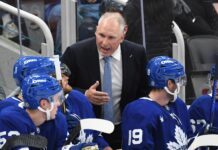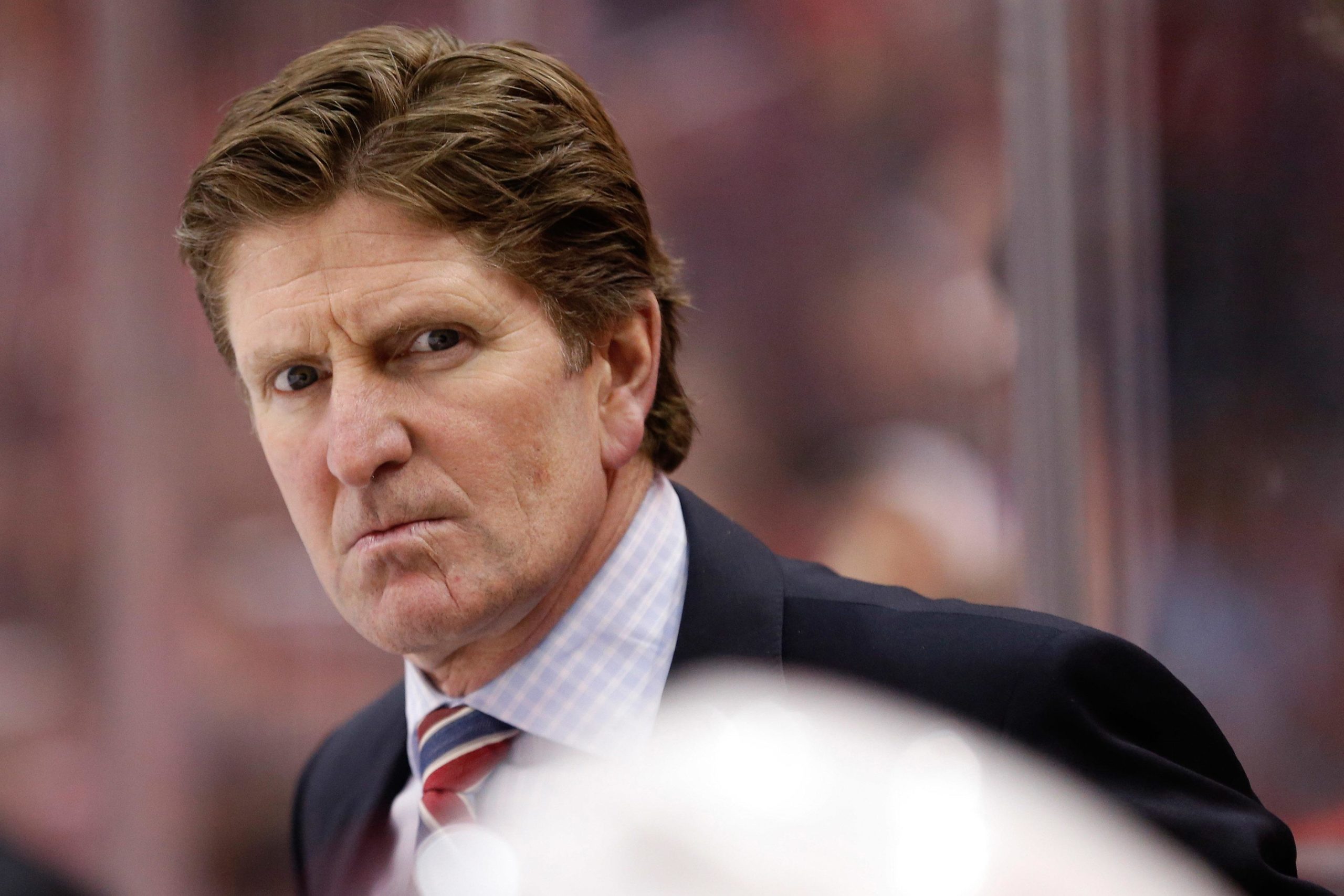From the moment it came out that Mike Babcock would possibly not return to Detroit, his name has been connected to the Toronto Maple Leafs.
Like any high profile free agent before him, all the big ticket names seemingly get attached to Toronto, where their name is thrown around in months of speculation with hardly any attention paid to the actual value that would be brought.
In short, many are saying the Leafs could get the crowned “best coach in the world,” without actually exploring what it is exactly that he brings and whether he would be a good fit in Toronto.
So, let’s get this out of the way with right off the top—Mike Babcock is an excellent coach, and it would be hard to argue otherwise. He has won two Olympic gold medals, a Stanley Cup, been to two other Finals, and has made the playoffs in 11 of his 12 years behind the bench. He has a .569 win percentage, and a .627 points percentage. He’s only 52 and he has already passed 500 wins as an NHL head coach, though that trails other current coaches such as Joel Quenneville, Ken Hitchcock, and Lindy Ruff (also former Leaf coaches Pat Quinn, and Ron Wilson; remember him?).
The Red Wings team possession numbers under Babcock since it was recorded on stats.hockeyanalysis.com are jaw dropping:
| Year | CF% Rank |
|---|---|
| 14-15 | 3rd |
| 13-14 | 9th |
| 12-13 | 6th |
| 11-12 | 1st |
| 10-11 | 2nd |
| 09-10 | 2nd |
| 08-09 | 1st |
| 07-08 | 1st |
In that time, Detroit has lost superstars such as Nicklas Lidstrom, Brian Rafalski and briefly Marian Hossa, along with a collection of above average contributors like Valtteri Filppula, Tomas Holmstrom, Brad Stuart, and a productive Daniel Cleary, all the while remaining competitive. One reason the Red Wings management liked him throughout their roster turnover is that they believed he could coach any style – dump and chase, defensive, offensive, puck possession—due to his success not only with the stacked Detroit roster, but also with the Anaheim Ducks.
Throughout that time he has continued to evolve and not only integrate young players into the roster as the core of the team ages, but act as a leader for them.
Babcock is one of, if not the, best neutral zone coaches in the NHL and it all stems through his defensive zone breakouts. Here is an excellent piece from Justin Bourne detailing some of the work he does through the middle of the ice with his centers. He also uses stretch passes effectively, as this example shows:
https://youtu.be/Mwwdh3rRihY
In that game against the Leafs, on November 22nd, they used similar stretch passes multiple times to cut through the Leafs passive forecheck (I was at the game). You can see the forwards in the defensive zone are already pushing up ice as soon as Kronwall steps out to make the pass, and Tatar knows to curl and wait for them to provide options. Here is a goal with a similar stretch pass off a zone release:
Detroit uses their breakouts in a variety of fashions to create offense, more so with short quick passes and centers swinging low and covering a lot of ice. You can also put together a yearly montage of goals they score off of forcing turnovers in the neutral zone or at their blue line and turning up ice on an odd man rush before burying.
The saying that has quietly followed Babcock’s name around rinks is that he tells the players, “You play my way until the offensive blue line, and I’ll let you play your way in the offensive zone.” At least in terms of bringing it to the NHL, Detroit was the first to use the neutral zone drop pass power play breakout consistently. He is also big on pairing up forwards in groups of two and rotating the third player on each line as he sees fit, which a lot of coaches have emulated, particularly his assistants that have gone on to coach elsewhere.
In his time thus far in the NHL, Babcock has not only proven to be wildly successful, but innovative, creative, and versatile.
All that said, Detroit has won only three playoff series’ combined in the last six seasons. Which goes to show you that for as good as a coach Babcock is –and making the playoffs every year is not to be taken lightly—a good coach can only do so much. Babcock is not a number one center, defenseman or goalie, but the possibility of acquiring him is almost being treated as such.
Therein lays the potential rub of hiring Mike Babcock for the Leafs. The team is bottoming out at the moment and is gearing up to trade key, productive veterans for youth. Depending on how NHL ready the returns are –and past history tells us not much—there is a distinct possibility the NHL roster will actually be even worse next season, barring an upswing in goaltending.
Timing is everything in life, and in hockey it is no different. The Buffalo Sabres, for example, are ready to begin climbing up now. They’ve bottomed out and have been rewarded with Jack Eichel and Sam Reinhart to build down the middle with among other high first round picks, and they traded for Evander Kane. They are ready to start the long road back towards being competitive, finally.
The Leafs are not as lucky, but also not as far off as Buffalo was a few years ago. It has been discussed here repeatedly, but there are legitimate pieces in the Toronto Maple Leafs organization in place that will help turn this thing around rather quickly, but they aren’t there yet.
Babcock would get his one year grace period in Toronto, but as we’ve seen before, it doesn’t last long before fans and media start questioning a highly regarded coach for not being successful regardless of circumstance. Call it the Ron Wilson effect. Babcock is most likely a better coach than Wilson, but Wilson was no slouch and currently has more wins in the league than Babcock does to show for it.
Wilson’s first year in Toronto actually went reasonably well. The team finished 24th when most thought they’d place last, Mikhail Grabovski had a 20 goal rookie season, Jason Blake and Alex Ponikarovsky each passed the 60 point plateau, and the team was generally regarded as one of the hardest working in the league.
The next year, the team got worse and the criticism towards Wilson began to add up. Wilson has always been known as a bit of a combative coach with a sharp tongue and wit. While Babcock wouldn’t be given that exact description, he has often been described as egotistical, with Bryan Murray once calling him an arrogant bastard. It’s not difficult to imagine the same thing happening again with Babcock and the Toronto media (team is bad, Babcock gets called out, Babcock knows the team is bad and gets mouthy in his responses back, things spiral out of control). Especially when it comes to line combinations, where Babcock can make interesting decisions just like every other coach.
Good coaches pick and choose their jobs for a reason; they know they are only as good as their roster. We see this repeatedly with coach of the year winners getting fired within the following two seasons frequently. As the old saying goes—a good coach might only win you a few extra games, but a bad one will lose you more than you should.
That leaves Babcock’s short-term value to the Leafs as follows:
- You think this roster isn’t as bad as it has shown, and by moving out a few key anchors, introducing some positive additions, including youth, it can begin to be built up relatively quickly.
- You think Babcock’s stature and presence in the league can help recruit good players for a rather quick turnaround, which in this case would include coaxing players into waiving their no trade clauses to come to Toronto, for once. (It should be mentioned that Detroit has had a rather difficult time signing unrestricted free agents for pretty well Babcock’s entire tenure with some suggesting he’s partly to blame… Alhough, you know, it’s Detroit…).
- The roster is bad and continues selling off assets in an attempt to rebuild. Babcock, who is still a good coach, is able to squeeze extra points out of the lackluster squad so their draft pick is pushed out of top 5 territory and into the 6-12 range.
Most coaches who start a rebuild do not see it through. Before Joel Quenneville, there was Denis Savard. Before Darryl Sutter, there was Terry Murray. Before Jon Cooper, there was Guy Boucher. Before Dan Bylsma took Pittsburgh to the Cup, there was Michel Therrien. And the list goes on and on, and on. Some possible exceptions might be Claude Julien, who saw the Bruins rebuild right through (but he was buoyed by the signings of Zdeno Chara and Marc Savard the year prior and the beginning of the emergence of Tim Thomas, Milan Lucic and Phil Kessel) and maybe Jack Capuano has a chance right now if he stays employed, although that remains to be seen.
Toronto’s last two teams to have success began with great coach hirings and quick turnarounds, so the excitement around Babcock is understandable. Although it should be noted that Pat Burns’ first season was also Doug Gilmour’s first full season with the Leafs, and Pat Quinn signed Curtis Joseph before his first game with the team.
Maybe the Leafs have a trick up their sleeve –and there are a few players available that could change things quickly, in my opinion—but the talk has been about a slow, methodical rebuild through draft picks. Right now, Babcock would probably be set up for failure based on expectations, roster, and overall market pressure.
The interesting thing about Toronto at the moment, and it hasn’t been this way for decades, is that fans are completely indifferent to the team. There is an opportunity to hire a good coach that won’t ignite the fan base, and instead allow the team to develop, incrementally improving at the margins until they get to a point where they should be hiring a Mike Babcock to take them to the next level. The Flyers just did it with Dave Hakstol, to a degree. That fits the bill of some of the coaches the Leafs have been linked to, like Guy Boucher, Kirk Muller, and Jeff Blashill.
Bringing in people who are at the top of their class is never a bad thing. It is easy to see how players such as Morgan Rielly and Nazem Kadri in particular would benefit from Babcock’s tutelage and leadership on the road back to respectability.
The question for the Leafs is really what they are trying to do. If they want to tank and continue to collect high draft picks, this isn’t the guy to do it with. If they want to get better this summer and start making moves to get competitive, Babcock would be a great hire. There is no in between here.

































